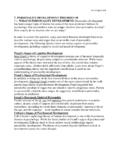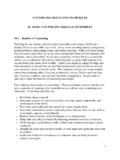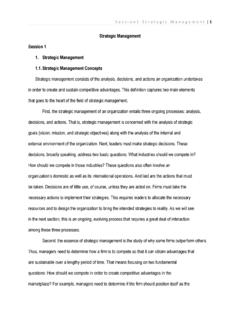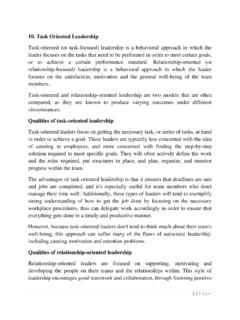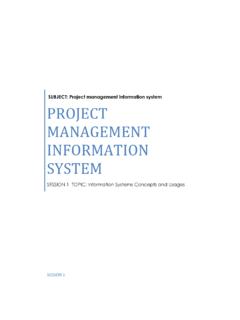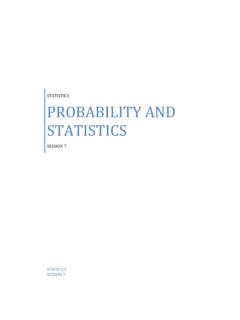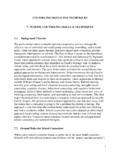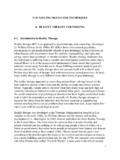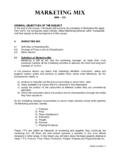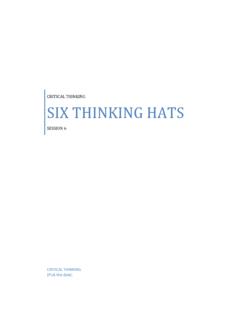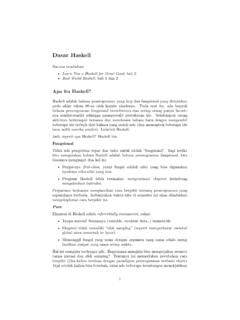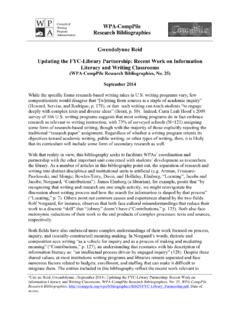Transcription of Mathematics 1.1 definition of mathematics
1 Page 1 of 8 Mathematics definition of Mathematics : Mathematics is the study of topics such as quantity (numbers), structure, space and change. There is a range of views among mathematicians and philosophers as to the exact scope and definition of Mathematics . Mathematicians seek out patterns and use them to formulate new conjectures. Mathematicians resolve the truth or falsity of conjectures by mathematical proof. When mathematical structures are good models of real phenomena, then mathematical reasoning can provide insight or predictions about nature. Through the use of abstraction and logic, Mathematics developed from counting, calculation, measurement, and the systematic study of the shapes and motions of physical objects. Practical Mathematics has been a human activity for as far back as written records exist.
2 The research required to solve mathematical problems can take years or even centuries of sustained inquiry. Rigorous arguments first appeared in Greek Mathematics , most notably in Euclid's Elements. Since the pioneering work of Giuseppe Peano (1858 1932), David Hilbert (1862 1943), and others on axiomatic systems in the late 19th century, it has become customary to view mathematical research as establishing truth by rigorous deduction from appropriately chosen axioms and definitions. Mathematics developed at a relatively slow pace until the Renaissance, when mathematical innovations interacting with new scientific discoveries led to a rapid increase in the rate of mathematical discovery that has continued to the present day. Galileo Galilei (1564 1642) said, "The universe cannot be read until we have learned the language and become familiar with the characters in which it is written.
3 It is written in mathematical language, and the letters are triangles, circles and other geometrical figures, without which means it is humanly impossible to comprehend a single word. Without these, one is wandering about in a dark labyrinth." Carl Friedrich Gauss (1777 1855) referred to Mathematics as "the Queen of the Sciences". Benjamin Peirce (1809 1880) called Mathematics "the science that draws necessary conclusions". David Hilbert said of Mathematics : "We are not speaking here of arbitrariness in any sense. Mathematics is not like a game whose tasks are determined by arbitrarily stipulated rules. Rather, it is a conceptual system possessing internal necessity that can only be so and by no means otherwise." Albert Einstein (1879 1955) stated that "as far as the laws of Mathematics refer to reality, they are not certain; and as far as they are certain, they do not refer to reality.
4 "French Page 2 of 8 mathematician Claire Voisin states "There is creative drive in Mathematics ; it's all about movement trying to express itself." Mathematics is used throughout the world as an essential tool in many fields, including natural science, engineering, medicine, finance and the social sciences. Applied Mathematics , the branch of Mathematics concerned with application of mathematical knowledge to other fields, inspires and makes use of new mathematical discoveries, which has led to the development of entirely new mathematical disciplines, such as statistics and game theory. Mathematicians also engage in pure Mathematics ; or Mathematics for its own sake, without having any application in mind. There is no clear line separating pure and applied Mathematics , and practical applications for what began as pure Mathematics are often discovered.
5 Evolution The evolution of Mathematics might be seen as an ever-increasing series of abstractions, or alternatively an expansion of subject matter. The first abstraction, which is shared by many animals, was probably that of numbers: the realization that a collection of two apples and a collection of two oranges (for example) have something in common, namely quantity of their members. Evidenced by tallies found on bone, in addition to recognizing how to count physical objects, prehistoric peoples may have also recognized how to count abstract quantities, like time days, seasons, years. More complex Mathematics did not appear until around 3000 BC, when the Babylonians and Egyptians began using arithmetic, algebra and geometry for taxation and other financial calculations, for building and construction, and for astronomy.
6 The earliest uses of Mathematics were in trading, land measurement, painting and weaving patterns and the recording of time. In Babylonian Mathematics elementary arithmetic (addition, subtraction, multiplication and division) first appears in the archaeological record. Numeracy pre-dated writing and numeral systems have been many and diverse, with the first known written numerals created by Egyptians in Middle Kingdom texts such as the Rhind Mathematical Papyrus. Between 600 and 300 BC the Ancient Greeks began a systematic study of Mathematics in its own right with Greek Mathematics . Page 3 of 8 Mathematics has since been greatly extended, and there has been a fruitful interaction between Mathematics andscience, to the benefit of both. Mathematical discoveries continue to be made today.
7 According to Mikhail B. Sevryuk, in the January 2006 issue of the Bulletin of the American Mathematical Society, "The number of papers and books included in the Mathematical Reviews database since 1940 (the first year of operation of MR) is now more than million, and more than 75 thousand items are added to the database each year. The overwhelming majority of works in this ocean contain new mathematical theorems and their proofs." Etymology The word Mathematics comes from the Greek (m th ma), which, in the ancient Greek language, means "that which is learnt", "what one gets to know", hence also "study" and "science", and in modern Greek just "lesson". The word m th ma is derived from (manthano), while the modern Greek equivalent is (mathaino), both of which mean "to learn".
8 In Greece, the word for " Mathematics " came to have the narrower and more technical meaning "mathematical study" even in Classical times. Its adjective is (math matik s), meaning "related to learning" or "studious", which likewise further came to mean "mathematical". In particular, (math matik t khn ), Latin: ars mathematica, meant "the mathematical art". In Latin, and in English until around 1700, the term Mathematics more commonly meant "astrology" (or sometimes "astronomy") rather than " Mathematics "; the meaning gradually changed to its present one from about 1500 to 1800. This has resulted in several mistranslations: a particularly notorious one is Saint Augustine's warning that Christians should beware of mathematic imeaning astrologers, which is sometimes mistranslated as a condemnation of mathematicians.
9 The apparent plural form in English, like the French plural form les math matiques (and the less commonly used singular derivative la math matique), goes back to the Latin neuter pluralmathematica (Cicero), based on the Greek plural (ta math matik ), used by Aristotle (384 322 BC), and meaning roughly "all things mathematical"; although it is plausible that English borrowed only the adjective mathematic(al) and formed the noun Mathematics anew, after the pattern of physics and metaphysics, which were inherited from the Greek. In English, the noun Mathematics takes singular verb forms. It is often shortened to maths or, in English-speaking North America, math. Page 4 of 8 Definitions of Mathematics Aristotle defined Mathematics as "the science of quantity", and this definition prevailed until the 18th century.
10 Starting in the 19th century, when the study of Mathematics increased in rigor and began to address abstract topics such as group theory and projective geometry, which have no clear-cut relation to quantity and measurement, mathematicians and philosophers began to propose a variety of new definitions. Some of these definitions emphasize the deductive character of much of Mathematics , some emphasize its abstractness, some emphasize certain topics within Mathematics . Today, no consensus on the definition of Mathematics prevails, even among professionals. There is not even consensus on whether Mathematics is an art or a science. A great many professional mathematicians take no interest in a definition of Mathematics , or consider it indefinable. Some just say, " Mathematics is what mathematicians do.
